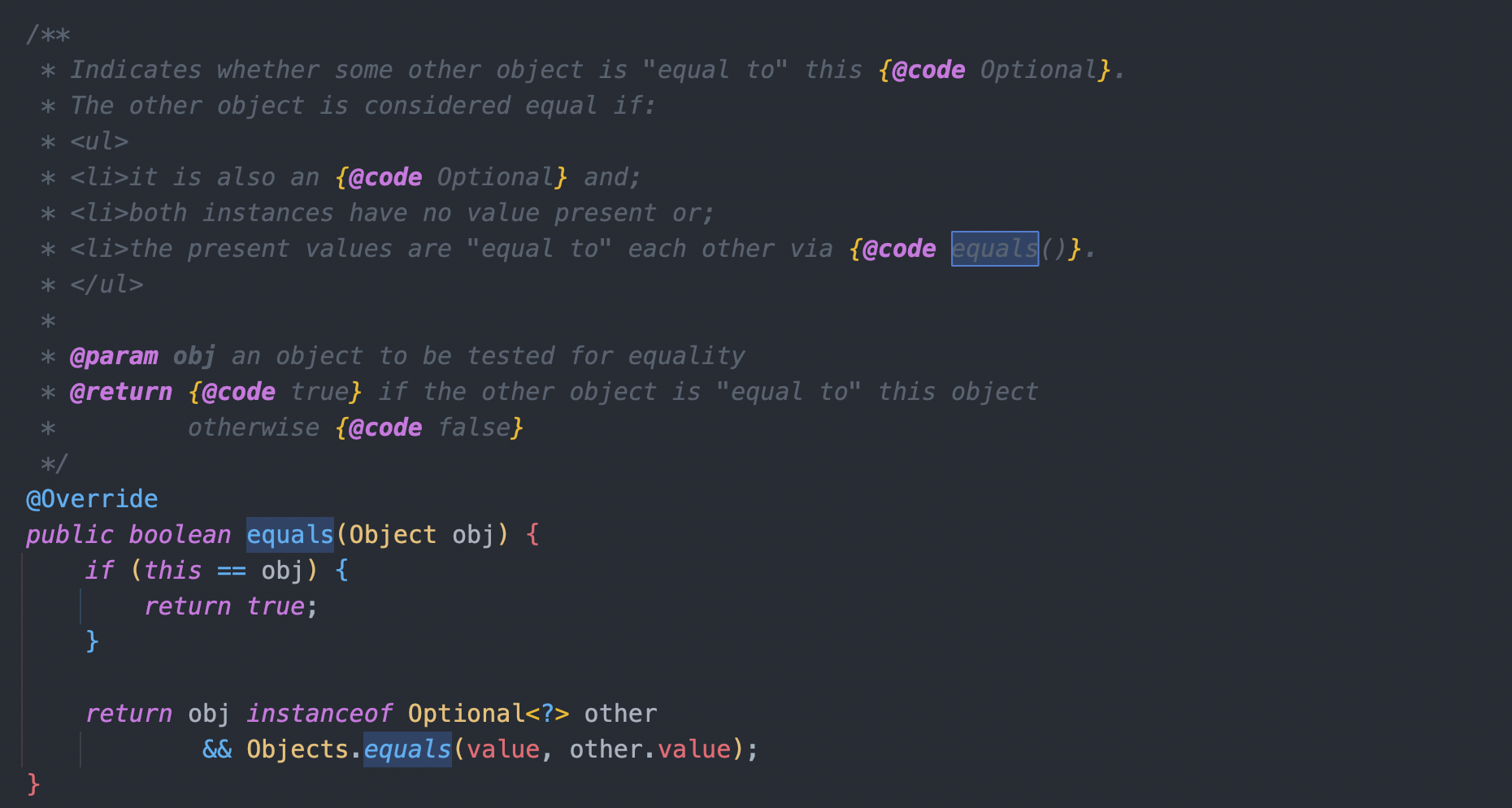Java의 Optional
- 자바 8에서 추가된 래퍼 클래스로 결과 값이 없을 수 있음을 나타내고, 이를 확인하고 처리하기 위한 api를 제공한다
Optional<SomeObject> someMethod() {
...
return Optional.ofNullable(someObject);
}
// 클라이언트 코드
SomeObject someObject = someMethod()
.orElseThrow(() -> new NullPointerException("객체가 null!");- Optional을 만든 Brian Goetz는 그 의도를 다음처럼 설명한다
... we did have a clear intention when adding this feature, and it was not to be a general purpose Maybe type, as much as many people would have liked us to do so. Our intention was to provide a limited mechanism for library method return types where there needed to be a clear way to represent "no result", and using null for such was overwhelmingly likely to cause errors.
- 오늘은 Optional을 의도대로 잘 사용하는 방법과, 주의사항을 정리한다!
1. 필드나 메소드 패러미터에 사용하지 마라
-
위에서 언급한 것처럼 Optional은 의도를 가지고 만들어졌다. 필드나 메소드에 이를 사용하는 것은 과용이다. 메소드 반환 타입으로만 사용하도록 하자
-
추가적으로 필드에 Optional 사용시 직렬화가 되지 않는다
// Bad!
class SomeClass {
private Optional<String> sth;
String someMethod(Optional<String> param) {
...
}
}
// Good!
class OtherClass {
private String oth;
Optional<String> otherMethod(String param) {
...
}
}
2. 검증하지 않고 get()하지 마라
- Optional 타입이라는 것은 감싸진 객체가 null일 수 있다는 것이다. 너무나도 당연하고 IDE가 아마 경고까지 해줄테지만, 객체가 있는지 확인하지 않고
get()을 호출하지 말자
// Bad
Optional<String> optText = getText();
String text = optText.get();
// Good
Optional<String> optText = getText();
String text = optText.orElseThrow(() -> new NullPointerException(""));
String text2 = optText.orElse("");
... 등등등 다양한 Optional api를 활용하자 - 확인하지 않는다면 애초에 Optional을 사용할 이유가 없다. Brian Goetz는
get()메소드 이름을 지은 것을 후회한다며 다음과 같이 말했다
NEVER call
Optional.getunless you can prove it will never be null; instead use one of the safe methods likeorElseorifPresent. In retrospect, we should have called get something likegetOrElseThrowNoSuchElementExceptionor something that made it far clearer that this was a highly dangerous method that undermined the whole purpose of Optional in the first place.
3. 단순 Null 체크를 위해 사용하지 마라
- 다음과 같이 Optional을 단순 null 체크를 위해 사용하는 코드를 본적이 있다
public void someMethod(SomeObject object) {
Optional.ofNullable(object).orElseThrow(() -> new NullPointerException());
...
}-
위 코드는 Optional의 의도와 다르게 사용하고 있을 뿐만 아니라, null이 아닌 경우 객체를 반환함에도 이를 사용하지 않고 있다
-
위 같은 상황에서는 그냥 명시적으로 null 체크를 하자
public void someMethod(SomeObject object) {
if (object == null) {
throw new NullPointerException();
}
...
}- 만약 이런 보일러플레이트가 싫다면 자동으로 생성해주는 Lombok의 @NonNull을 사용할 수도 있다
public void someMethod(@NonNull SomeObject object) {
...
}4. API를 적극 활용하라
- 기왕 Optional을 사용하는거 최대한 api를 활용해 가독성을 높이자. Optional은 정말 다양한 API를 제공한다
Optional<Object> optObject;
Object object;
// Bad
if (optObject.isPresent()) {
object = optObject.get();
} else {
throw new NullPointerException("null!");
}
// Good
// 참고로 orElseThrow는 자바 10부터 추가됐다
object = optObject.orElseThrow(() -> new NullPointerException("null!"));filter(),map()과 같은 api는 사용하는 것을 잘 보지 못했다. 한번 사용해보자!
5. 배열이나 컬렉션을 감싸지 마라
- Optional은 결과가 없음을 나타낸다. 배열과 컬렉션은 내용 없는 객체를 반환할 수 있으므로 Optional을 사용할 이유가 없다.
// Bad
Optional<List<Integer>> method1() ...
Optional<int[]> method2() ...
// Good
List<Integer> method1() {
...
return Collections.emptyList();
}
Optional<int[]> method2() {
...
return new int[0];
}6. of()와 ofNullable()을 구분하라
-
메소드명에서 알 수 있듯이
ofNullable()은 null이 들어갈 수 있다. 반대로of()에는 null이 들어가면 NPE가 발생한다 -
만약
of()에서 NPE가 발생했다면, 뭔가 의도치 않은 잘못된 동작이 실행 됐음을 알 수 있다
7. Optional<T>를 피할 수 있으면 피해라
-
객체를 감싸는 Optional<T>이외에도 프리미티브 값을 감쌀 수 있는 OptionalInt, OptionalDouble 등이 존재한다
-
객체로의 박싱을 피하기 위해 위 객체들을 사용하자
// 특히 값을 이용해 연산을 하는 등 박싱/언박싱이 많이 발생하는 상황에서 사용하면 성능에 나쁘다
// Bad
Optional<Integer> optNum;
// Good
OptionalInt optNum;8. 동등성 비교를 위해 객체를 꺼내지 마라
- Optional의
equals()는 1) 동일한 객체, 2) 비어있는 Optional, 3) 감싼 객체의 equals로 비교시 동등한 경우 동등하다고 판단하도록 오버라이딩 되어있다

- 따라서 감싸진 객체의 비교를 위해 Optional에서 꺼낼 필요가 없다
// Bad
Optional<SomeObject> someObj;
Optional<OtherObject> otherObj;
assertEquals(someObj.get(), otherObj.get());
// Good
Optional<SomeObject> someObj;
Optional<OtherObject> otherObj;
assertEquals(someObj, otherObj);참고자료
https://dzone.com/articles/java-8-optional-how-use-it
https://dzone.com/articles/using-optional-correctly-is-not-optional

